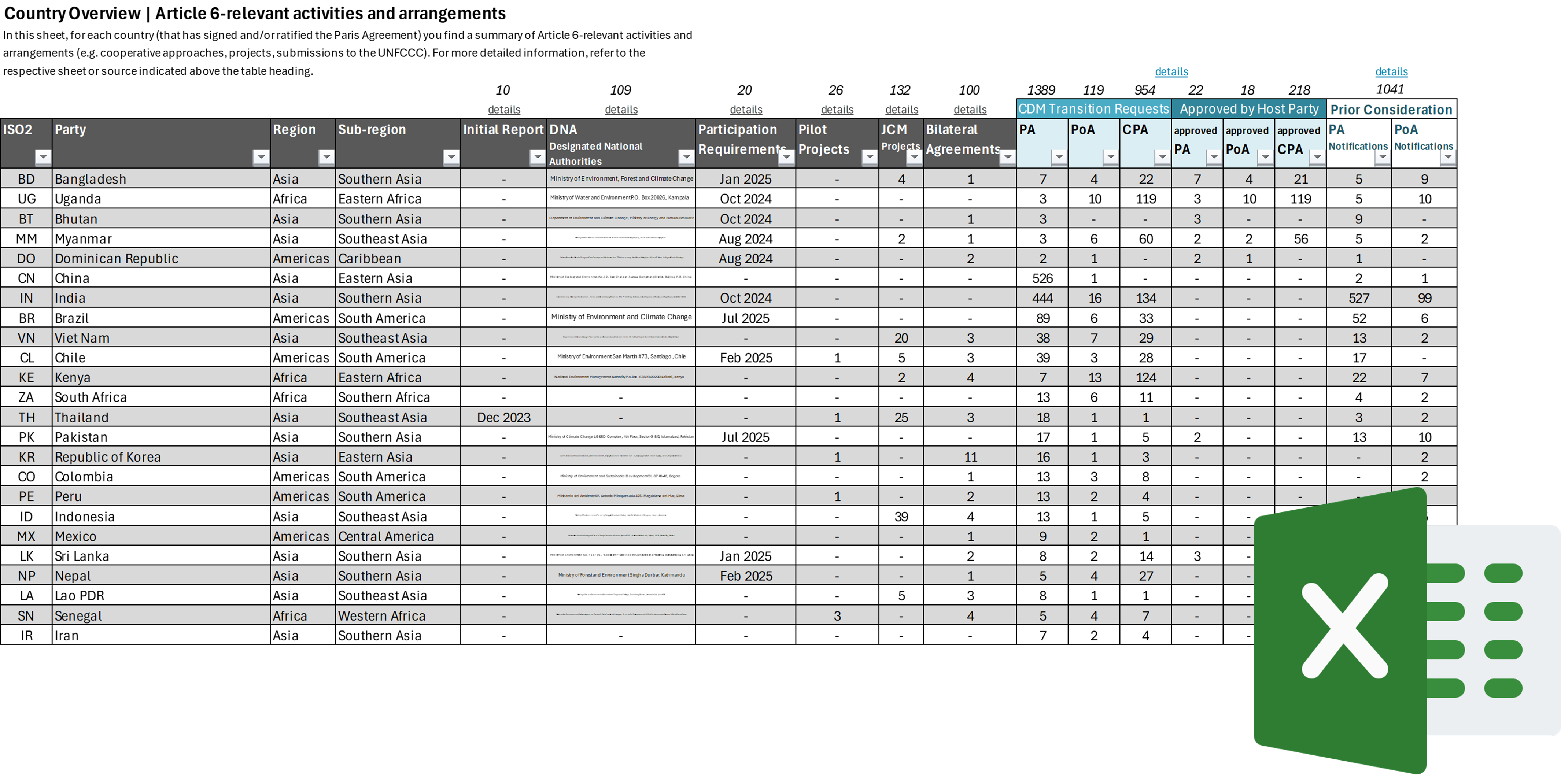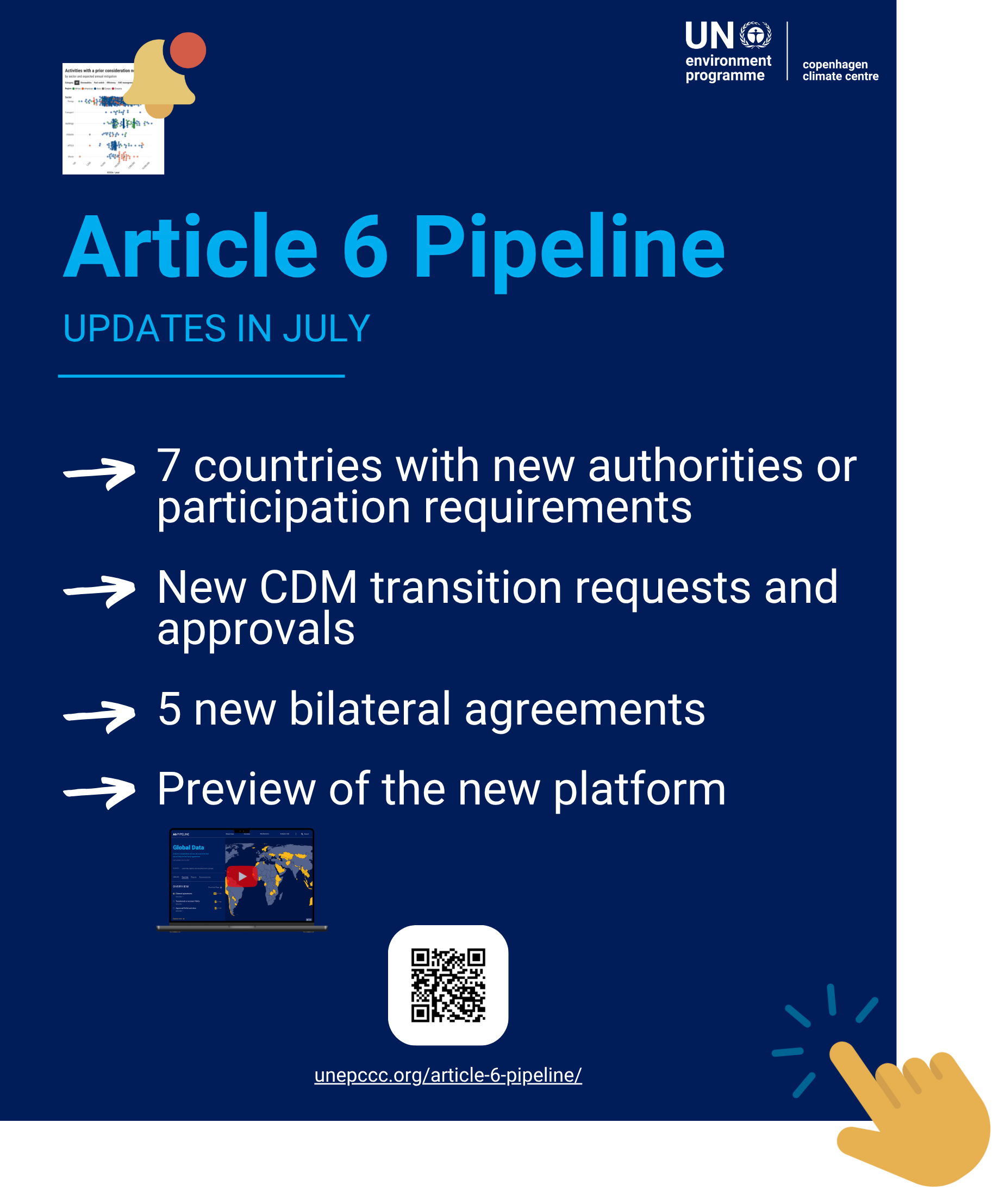Article 6 Pipeline
Article 6 of the Paris Agreement provides a framework for countries to cooperate towards the implementation of their Nationally Determined Contributions (NDCs) through carbon markets (Articles 6.2 and 6.4) and non-market modalities (Article 6.8). This collaboration can help countries to achieve and enhance their NDC targets. The overall objective is to increase climate ambition, promote sustainable development, and safeguard environmental integrity.
Building on the extensive experience from the Clean Development Mechanism (CDM), UNEP Copenhagen Climate Centre (UNEP-CCC) has set up an Excel-based database for Article 6 activities. The aim is to provide insights on the development of Article 6 projects, their contribution to countries’ NDC implementation and SDG achievement at the national and global level.
UNEP-CCC will continue expanding the Pipeline’s functionality as new Article 6 activities emerge and the modalities of the cooperative approaches become clearer. Ultimately, the A6 Pipeline will take the shape of a more interactive and user-friendly platform. This will increase transparency and allow you to easily explore the details and context of cooperation under Article 6. The video below gives a short preview of the new platform that will be launched later this year.
First Proposed Activities for the Paris Agreement Crediting Mechanism (PACM) under Article 6.4 – Notifications of Prior Consideration
As part of the Article 6.4 Activity Cycle, project proponents need to submit prior consideration notifications. This is to demonstrate that the benefits of participating in the mechanism were taken into account before implementing the activity. Currently, a total of 1041 notifications for activities were submitted and published (Prior consideration notifications | UNFCCC) – this includes 824 projects and 217 programmes. The interactive graph below shows the geographical distribution of the proposed activities.
The following chart shows that most of these projects have already begun a few years ago. However, the deadline for these retroactive notifications has passed. From now, proponents need to submit the notification no later than 180 days after the start of the project.
The second slide illustrates in which sectors these activities aim to mitigate emissions and how large the impact (in tonnes of CO2 equivalents per year) is estimated to be. Each dot represents one activity and clicking on it reveals additional information. This includes parameters like the host Party, type of activity, the start date, and a link to the submitted form for further context. The third slide gives the same overview for all programmes.
By selecting a geographic region or category, the activities and emerging patterns can be explored in more detail. For example, (renewable) energy projects represent the most common category with more than 350 projects and covers a wide range of different sizes – from just a few hundred tonnes per year for a solar project in Zambia to a leak detection and repair system for fossil gas infrastructure in Uzbekistan that could generate more than 7 million credits annually.
The data and categorizations are based on the limited information from the forms submitted to the UNFCCC Secretariat. While future revisions based on a more detailed understanding of the projects are likely, this first overview provides insights into the kind of activities are being pursued under the new mechanism.
Activities Transitioning from the Clean Development Mechanism (CDM) to Article 6.4
The deadline for submitting requests has passed. In this explainer video, we examine those activities that intend to transition using CDM methodologies and outline the next steps.
Video on the CDM Transition (08:30 minutes) – find the slide deck here
As of 14 July 2025, transition requests were correctly submitted for 1,389 Project Activities (PA), 119 Programmes of Activities (PoA), and (together with these PoAs) 954 Component Project Activities (CPA) (see the figure below). Some Parties have approved the transition of these CDM activities. This includes 22 PA, 18 PoA, and 218 CPA hosted in Bangladesh, Bhutan, the Dominican Republic, Ghana, Myanmar, Pakistan, Sri Lanka, and Uganda.
Of the potential reductions of around 1.5 billion tonnes of CO2e that eligible activities could generate after transition while using CDM methodologies, this could amount to more than 900 million tonnes (60%) if all requests were approved.
For more details (such as submissions by host countries, regions, and activity types) please refer to the sheet Analysis | PACM in the A6 Pipeline. Additional background on the projects potentially transitioning to the Paris Agreement Crediting Mechanism (PACM) under Article 6.4 can be found in the CDM Pipeline and on the UNFCCC website.
Designated National Authorities
Based on the last update on 4 July 2025, 109 Parties communicated their Designated National Authority (DNA) to the UNFCCC secretariat. More than two-thirds of all Parties across Africa (41 countries | 76%) have submitted information about their DNA, followed by Asia (29 | 60%) and the Americas (21 | 60%). Regular updates can be found here: Designated National Authorities (DNAs) | UNFCCC
Overview of the Bilateral Agreements and pilot projects/activities under Article 6.2 of the Paris Agreement
The graph and table below provide an overview of Bilateral Agreements (BA) for the cooperation under Article 6.2 of the Paris Agreement as of 14 July 2025. This also includes memoranda of understanding (MoU) or other official statements that show the intention to collaborate and potentially engage in trading of mitigation outcomes under Article 6.
- There are 100 BAs between 61 different countries
- A total of 158 pilot projects have been recorded, out of which 132 belong to Japan’s Joint Crediting Mechanism (JCM).
The table below shows all agreements including associated projects and can easily be searched and filtered. The colours indicate the host region, which is further explored in the chart at the very bottom.
This final chart summarizes the cooperation among countries from the different regions. The representation of each region as a potential host of projects or seller of international mitigation outcomes is illustrated by the size of each coloured area. Whether the potential buyers are from the same or another region, can be traced by following or hovering over each of the chords.
For example, there are several agreements where countries from Africa or the Americas are expected to be the potential host of projects but none where they are the buyer. At the same time, the majority of expected transactions from Asian countries would also be transferred to buyers from Asia (mainly Japan, Singapore and South Korea).
Monthly News on the Article 6 Pipeline:
This month, the Article 6 Pipeline includes the following updates:
- Paris Agreement Crediting Mechanism (PACM):
- Bolivia, the European Union, Haiti, and the United Kingdom appointed a Designated National Authority.
- In their Participation Requirements forms, Brazil, Cambodia, and Pakistan provided information on sustainable development impacts and types of activities that they would consider approving.
- Transitions from the Clean Development Mechanism (CDM): One afforestation project in Uruguay has requested to transition. Pakistan (2) and Sri Lanka (3) have approved some of the requests for projects located in their countries – this includes activities for hydropower, waste-to-energy, wind, and industrial waste heat recovery.
- Prior Consideration Notifications for additional programmes were integrated to align with the UNFCCC’s new database – please note that this may include some duplications (i.e. more than one notification for the same activity, duplicate titles are highlighted in red in the Excel sheet).
- Bilateral Cooperation
- Five Implementation Agreements were signed – three of which following a previous announcement of the respective collaboration. Norway is cooperating with Switzerland and Indonesia, Sweden with the Dominican Republic and Kenya, and Japan signed a Memorandum of Cooperation with Tanzania.
- Three new projects are being set up as part of bilateral agreements – two for abating methane from rice cultivation in the Philippines (supported by Japan) and one for distributing electric cookstoves in Ghana (supported by Switzerland).
- For a cookstove programme based in Ghana, more than 11 thousand Internationally Transferred Mitigation Outcomes (ITMOs) were issued and will be (partially) used by Switzerland to achieve its climate commitments.
- Zimbabwe submitted its first initial report including a Cooperative Approach covering clean cooking projects.



